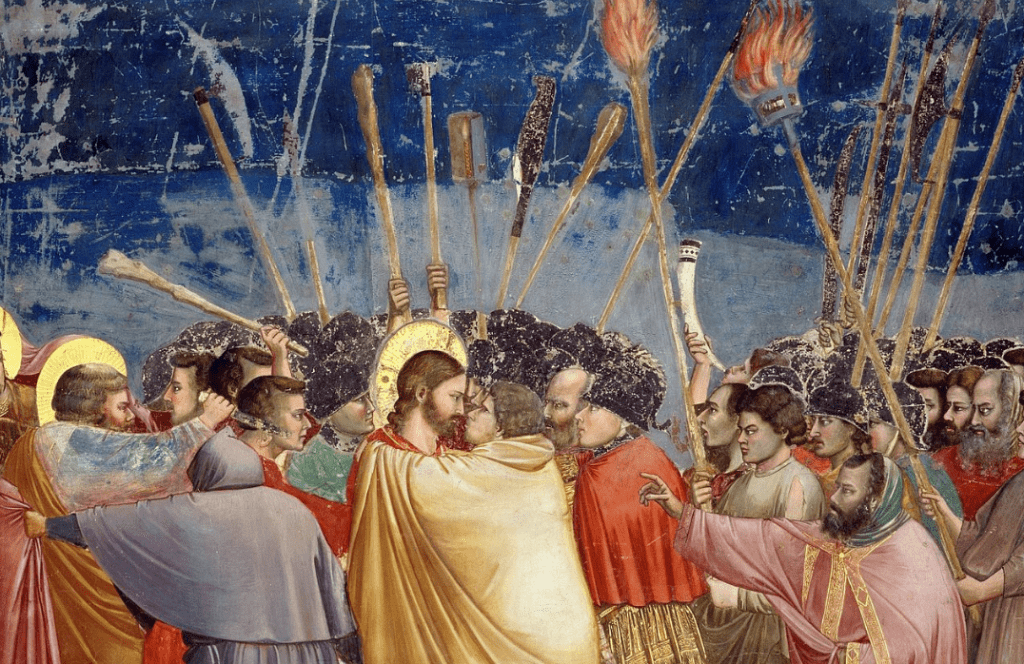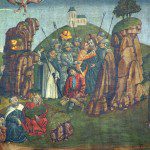Growing up we learn that Judas was the disciple who betrayed Jesus, and that’s true. What is also true is that Judas, I believe, is profoundly misunderstood.
The truth is, while he did screw over Jesus, I don’t think Judas was a bad guy– I just think he made a tragic miscalculation, like we all do at times.
As I’ve said over the years, the cultural context where the story takes place matters. Jesus and the disciples were living under a violent military occupation of their country. Imagine if you will, living in an America where a foreign country functionally captured us, dethroned our government, and ruled over us by force and violence– often nailing hundreds of people to trees along the highways as a constant reminder to keep your head down and mouth shut.
That’s the context the story of Jesus takes place in.
Just as in our context one of the popular discussions of the day is, “What do we do about ISIS?” in the time of Jesus the popular discussion was, “What do we do about the Romans?”
People disagreed on how to best deal with the fact that their entire country was basically being held hostage.
Some people, like the chief priest and tax collectors, cozied up to them in order to make life more bearable (nonresistance). Some, like Jesus, taught people to engage in a subversive love (nonviolent resistance). And others– like Judas– wanted a leader who would lead them to defeat Rome, and win freedom for their people (violent resistance).
All three positions at least make intellectual sense, and I can understand why someone would adopt any of the three.
When we step away from viewing Judas as a mole planted in the tribe of Jesus, when we resist viewing him as one who plotted to get Jesus killed, we see a different person. Judas has been literally demonized, and re-humanizing him invites us into a different picture.
When I see Judas through empathetic eyes I see someone who loved his country. I’m sure he loved his people. I imagine he was filled with a righteous anger at the injustice of being occupied, and was sick and tired of walking down dusty roads and seeing his fellow Israelites dead and hanging from trees. In Judas I see someone who desperately believed that God was about to save them from their suffering, as God had promised.
And I can imagine that day by day, he grew determined to do something about it.
I also believe that Judas deeply loved Jesus and believed in him– I can’t fathom him spending so much time following Jesus and learning from him, if he did not.
But here’s where things went wrong: I believe Judas thought that ultimately, under the right conditions, Jesus would lead them to a violent resistance. In fact, I think that Judas had *actually* placed all of his faith and trust in Jesus– particularly that Jesus was the awaited one who would free them.
It was a misunderstanding that led to the worst miscalculation one can think of.
When Jesus failed to emerge as a warrior Messiah, I believe Judas tried to intervene to make it happen.
“Maybe Jesus is just waiting for the right time?” or, “Maybe we just need an unavoidable clash with the authorities?” are among questions I imagine he pondered.
He got tired. Impatient. His anger against the injustice at the hands of the Romans grew by the day. He wanted to help Jesus fulfill his destiny, but totally misunderstood what that destiny was.
And so, taking matters into his own hands, he tried to arrange the meeting he thought would be the beginning of a revolution that would lead to their freedom.
Except, the whole thing backfired. Badly.
When the disciples tried to violently resist, Jesus actually rebuked them and willingly went to his death– not at all how Judas, Peter, or I’m sure other disciples, thought the whole thing would go down.
I don’t believe for a minute that Judas intended to harm Jesus or get him killed– I believe instead, Judas was trying to “invite” Jesus to take a stand against Rome, and all those who were colluding with them.
It was never about greed or money– he returned the money when it was over, and wouldn’t have followed a homeless rabbi for three years had greed and money been high priorities for him.
Instead, Judas was a guy who believed in his friend. He placed all of his hopes in him, and the dreams for the future of his people were in him.
He wasn’t intending to betray him– he just wanted to move the story along in the direction he thought it was supposed to go in.
And when the plan failed, when he accidentally got his friend and mentor killed, he was overwhelmed with grief. So overwhelmed, that he took his own life.
I grew up seeing Judas as the evil one– the one who sat quietly in wait until he could find a way to have Jesus killed. But now, I don’t see it that way at all.
When we invite our eyes to see with empathy, I think we get a different picture of Judas– someone who actually thought he was doing the right thing, but who in doing so, accidentally harmed someone he loved.
…
I think it’s easy to demonize people and to write them off as one of the “bad guys.” That’s exactly what’s happened to Judas for the last 2,000 years, and I think that’s unfortunate– because I don’t think Judas was one of the bad guys.
In fact, I think Judas was a lot like you and me.
We get impatient. We think we know what God should do in a given situation. We hatch plans that, in the moment, we think are good and wise and for the best.
And sometimes, those plans don’t turn out the way we had hoped, people we love get unintentionally hurt in the process, and we find ourselves filled with grief and remorse.
In this way, Judas is not some distant, evil character… he’s just a guy like you and me; someone who accidentally hurt one of the people he loved most.
 Dr. Benjamin L. Corey is a public theologian and cultural anthropologist who is a two-time graduate of Gordon-Conwell Theological Seminary with graduate degrees in the fields of Theology and International Culture, and holds a doctorate in Intercultural Studies from Fuller Theological Seminary. He is also the author of the new book, Unafraid: Moving Beyond Fear-Based Faith, which is available wherever good books are sold. www.Unafraid-book.com.
Dr. Benjamin L. Corey is a public theologian and cultural anthropologist who is a two-time graduate of Gordon-Conwell Theological Seminary with graduate degrees in the fields of Theology and International Culture, and holds a doctorate in Intercultural Studies from Fuller Theological Seminary. He is also the author of the new book, Unafraid: Moving Beyond Fear-Based Faith, which is available wherever good books are sold. www.Unafraid-book.com.
Be sure to check out his new blog, right here, and follow on Facebook:

















